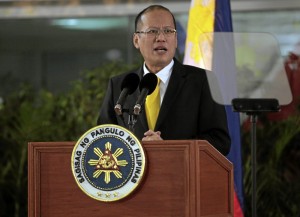FORT MAGSAYSAY, Nueva Ecija – President Benigno Aquino was 13 when he first set foot in this military camp, where his father, the late former Senator Benigno Aquino Jr., was detained at the onset of martial law.
Their family had visited the elder Aquino here in 1973, recounted the President who returned to Fort Magsaysay on Friday to open a human rights center and a shrine to mark the 40th anniversary of President Marcos’ declaration of martial law.
Many things have changed since Marcos’ ouster in a citizen-backed military uprising in 1986, Mr. Aquino said.
“We have gone a long way,” he said in Filipino. “This place, which the dictatorship once used to oppress those of us who stood up for our rights, is now a symbol that reminds us of the mistakes of the past. The Armed Forces of the Philippines, which was used to tyrannize Filipinos, can now be depended on as allies to protect our people.”
Mr. Aquino opened the Aquino-Diokno Shrine and the AFP Center for Human Rights Dialogue (AFP-HRD) at the reconstructed detention cell of his father and former Sen. Jose W. Diokno. The building used to house the Army’s intelligence service office.
When martial law was declared on Sept. 21, 1972, Senators Aquino and Diokno were arrested and detained in Fort Bonifacio until March 12, 1973, when they were taken to the military camp here and kept in separate cells.
“Sa lugar na ito tinangka ng diktadurya na tuluyan nang burahin ang kanilang prinsipyo’t durugin ang kanilang diwa [In this place, the dictatorship attempted to erase their principles and crush their spirit],” Aquino said.
Present at Friday’s opening of the shrine and the human rights center were the President’s sister Ballsy, members of the Diokno family and Defense Secretary Voltaire Gazmin who, Aquino said, was the young soldier assigned to guard his father’s cell. Gazmin, the President said, assured him that the senator would get adequate food.
When he first saw his father here, he did not cry, Aquino said. Instead, he was overwhelmed with anger at the authorities who had abused their power.
It was then that he started questioning events and seeking answers by reviewing history, he added. “Ano ang puno’t dulo ng diktadurya? Paano mawawakasan ang kalupitan? [How does a dictatorship start and end? How do we end cruelty and oppression]?” he had asked.
From his prison cell, Senator Aquino continued to write about the excesses of martial rule, which angered Marcos, the President said.
“Dahil sa paghahayag niya ng katotohanan, pilit pinatikom ang kanyang bibig sa paraang laganap at kinasisindakan ng madla: ang malupit at marahas na kamay na bakal ng diktadurya [Because he exposed the truth, they tried to silence him in a way that would strike fear among the people: (by using) the iron fist of the dictatorship],” he said.
Aquino also took the occasion to personally apologize to the Diokno family for the senator’s imprisonment.
“Alam po ninyo, ang sumulat ng artikulo, tatay ko lang. Ang pinarusahan, tatay ko at saka si Senator Diokno. Nadamay lang ho si Senator Diokno dito, at baka ho never kaming nagpasalamat sa inyong pakikisama at humingi ng tawad sa pagkakadamay n’yo. Kaya publicly humihingi ako ng paumanhin sa ngalan po ng aming pamilya [It was my father who wrote that article but they punished him and Senator Diokno. Senator Diokno was collateral damage and we’ve never had the chance to express our gratitude for your solidarity nor have we apologized for dragging your family into this issue. So I am publicly offering an apology on behalf of our family],” the President said.
He added: “Our experience is shared by thousands of families who suffered the wrath of martial rule. Their relatives were arrested or had disappeared, and have yet to be found to this day.”
But the country is in a different situation now, the President said, as he urged the military and all Filipinos to cherish freedom and uphold human rights.
“Patuloy sana nating isabuhay ang paninindigan ng akin pong ama at ni Senador Jose Diokno, at ng mga nagbuklod sa Edsa. Pinatunayan nilang posible ang pagtutuwid sa sistema nang walang pagdanak ng dugo [I hope that we continue to live the conviction shown by my father and Sen. Diokno, and by all the people who gathered at Edsa. They proved that it’s possible to correct a system without bloodshed],” he said.
